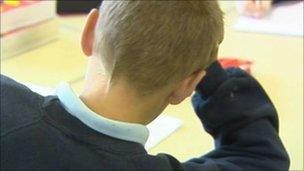11-year-olds face new grammar test in Sats
- Published

Sats tests have been overhauled
More than half a million 11-year-olds in England will sit a new grammar, spelling and punctuation test next week.
The new test is part of the national tests, known as Sats, taken by children in their final year of primary school.
Pupils will be asked to spot adverbs, nouns, adjectives and pronouns.
And they will have to spell words that are often misspelt, including "separate", "preferred" and "necessary".
The government has released specimen questions, external.
The new test is made up of a 45-minute grammar test and a separate 15-minute spelling test of 20 words. The government says pupils will need to show they can punctuate sentences properly, including using colons, apostrophes and "ellipses" (...).
Pupils are also tested on maths and mental maths.
The results of the tests are used to compile the school league tables. The tests have been shaken up after a review, prompted by complaints about marking and the standards of tests.
Teaching unions are opposed to the Sats tests and some boycotted them three years ago, saying that they forced teachers to "teach to the test", marking was unreliable and the results were too "high-stakes" because of the league tables.
'Understand our language'
Education Minister Elizabeth Truss said: "Many children struggle with the basics of the English language at primary school, then don't catch up at secondary school.
"That is why employers bemoan the poor literacy of so many school and college leavers.
"This new test will mean that children are again taught the skills they need to understand our language, and to use it properly, creatively and effectively."
Children will no longer be marked on a longer piece of writing.
Russell Hobby, general secretary of the National Association Head Teachers, said: "Grammar is vital but you test someone's writing skills by examining their writing.
"Just because you can circle an adverb on a multiple choice test doesn't mean you can use one properly. This test distracts us from teaching a generation to write clearly and elegantly."
This year, teenagers taking GCSEs in England will be given extra marks in some key subjects for correct spelling, punctuation and grammar for the first time.
- Published18 July 2011